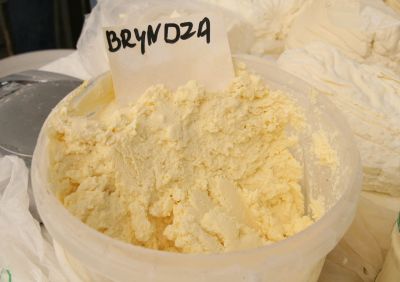Polish Cheese on EU Regional Products List
Bryndza podhalanska, a specialty Polish cheese, has won designation as an official EU brand, and although the process required to win this label was burdensome, it’s expected to pay dividends at the marketplace.
The cheese, made from sheep milk, has been officially assigned the European brand for regional products, the Internet news service Poland.pl reported. EU law protects regional food products, including bryndza, which also recently won official EU designation. Some products made by Polish highlanders await the official designation. They only lack producers who would be allowed to make them, the newspaper Gazeta Wyborcza reported. Many producers refuse to apply for an EU permit, as they fear the process will be overly complicated. The special designation comes from the EU Protect Food Names Program. It identifies regional and traditional foods whose authenticity and origin can be guaranteed. The designation, also available for wines and spirits, protects the heritage, character and reputation of locally produced food and drink.
The road to winning the EU designation is difficult. The EU web site describes a rigorous application and verification process that can take as long as two years to complete. All products registered under the three designations will be subject to inspection to ensure that the requirements of the registered specification are met. Products with protected name status fall into three categories: Protected Designation of Origin (PDO); Protected Geographical Indication (PGI); Traditional Specialty Guaranteed (TSG). Bryndza falls into the first category. All the designations require precise product specification. This must include information about the method of production, including the origin, nature and characteristics of the raw materials.
Historical evidence linking the product to the geographical area or to substantiate the character of the product is also required. But the difficulty of the process is offset by the benefits it brings. Producers who have registered their products for protection have enjoyed raised awareness across Europe and benefited from consumers’ increasing appreciation of the importance of regional and specialty foods. And what some see as perhaps the most valuable advantage of being on the list is that under this system a named food or drink registered at a European level will be given legal protection against imitation throughout the EU.
The EU list includes such products as Greek feta, Italian Parmigiano Reggiano cheese or the Hungarian Tokay wine. Bryndza is the first Polish product to receive designation of origin or PDO (Protected Designation of Origin) certificate. However, making bryndza in a designated area of the mountainous south and following a special local recipe is not enough to receive the EU logo. Every gazda (owner of agricultural homestead in Podhale) must get the required certificate. Because the application process is so difficult few producers from Podhale have received EU certificates.
To receive certification, the bacowka (a cottage where traditional highlanders’ cheese is produced) must be controlled by an EU commission. It examines the health conditions of both the sheep and workers and checks the purity of the water supply. If all the requirements are met, the examined producer receives what is termed a veterinary number. This number helps to identify who has produced certain cheese or other sheep milk products, Piotr Kohut told Gazeta Wyborcza. He is the first producer in the Koniakow region to receive the veterinary number. He said inspection of the equipment and facilities is not as troublesome as dealing with the bureaucracy. He added that though difficult, there is nothing in the EU process to be afraid of.
Soon the process of registration of another Polish highlanders’ cheese, oscypek, is going to get under way. Until recently it was impossible, because of a Slovak protest regarding name origin and allowed cow milk content. As oscypek is also produced in Slovakia an agreement has been worked out.

